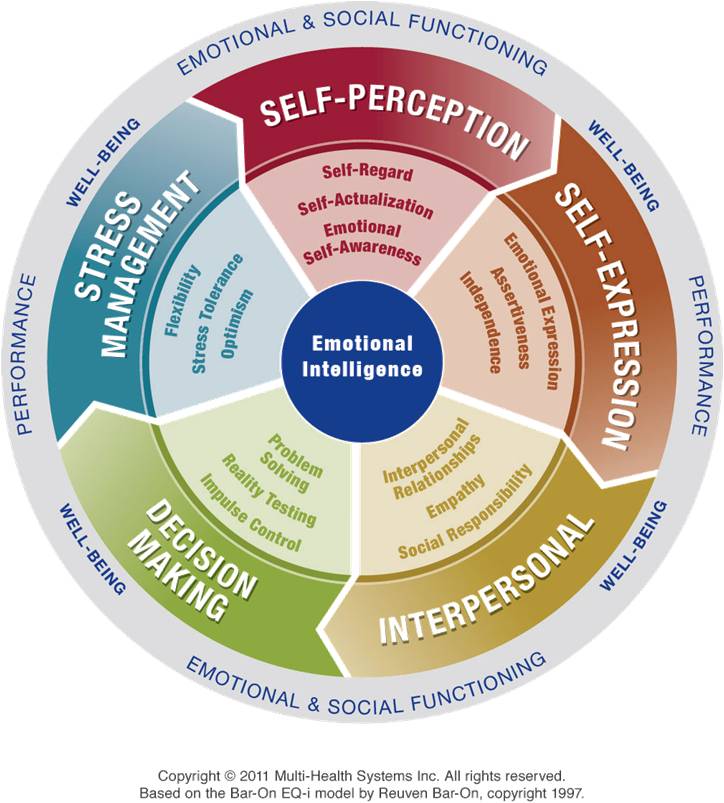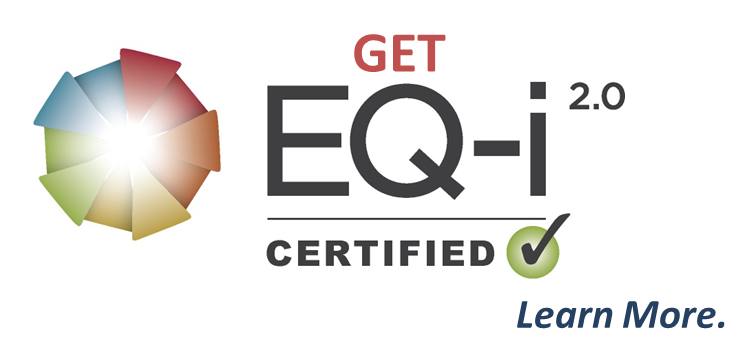Part 1: Overdoing EQ
The common (and incorrect) way to approach Emotional Intelligence (and the EQ-i specifically) is to assume that, simply, more is better. Broadly considered, high engagement with EQ’s various elements is a good thing, but of course, the devil is in the details. Too much energy or engagement with any EQ behavior could become as much a liability as its deficit.
Self-Actualization
The ability or tendency to set a goal and strive toward its completion, Self-Actualization is our engine forward—the urge to be better, stronger and smarter. Someone lacking Self-Actualization comes across as lazy, disengaged and even ignorant, but over-engagement with this element can also pose challenges.
An Overdone Portrait: Travis
 Travis is a high performer—driven toward achievement and continuous improvement. His boss has asked him to produce an ongoing series of status reports for a project team doing critical work. In spite of his boss’s repeated requests to keep the reports brief and summative, Travis–eager to do well and deeply interested in the group’s performance–invests considerable time and attention in the monitoring and reporting of this team’s efforts. Travis feels anything worth doing is worth doing better the next time (reflected in his high Self-Actualization score in the EQ-i).
Travis is a high performer—driven toward achievement and continuous improvement. His boss has asked him to produce an ongoing series of status reports for a project team doing critical work. In spite of his boss’s repeated requests to keep the reports brief and summative, Travis–eager to do well and deeply interested in the group’s performance–invests considerable time and attention in the monitoring and reporting of this team’s efforts. Travis feels anything worth doing is worth doing better the next time (reflected in his high Self-Actualization score in the EQ-i).
As is so often the case with those elements on which we score highly, Travis struggles to see how his commitment to Self-Actualization could be anything but positive, but to his boss’s eyes he is wasting time and demonstrating an inability to listen, follow directions and alter his approach.
| Important: Scores are data—they are not good or bad. The point of the EQ-i is the behavior it gives you a handle on, not the numbers on the page. A score of 127 is an objectively high score. Travis is more engaged with Self-Actualization than is about 95% of the population. The intensity of this behavior is the important insight—the number is merely an indicator of these behaviors. A score this high could indicate an area of strength and development while it could also foretell patterns that Travis overdoes. The higher someone’s score, the more both of these possibilities are likely true. Scores should never answer your questions—the job of a score is to provoke our curiosity and a deeper look at our own patterns and development. |
Assertiveness
The ability or tendency to put your needs and opinions into the world—even when so-doing invites tension, push-back or conflict, Assertiveness helps you put a stake in the ground and defend it and to stand up for yourself. Lacking Assertiveness can make you appear weak, shy, timid or even duplicitous or sneaky, but overdone Assertiveness can be just as career-derailing.
An Overdone Portrait: Kim
 Long used to leadership roles, Kim has gravitated toward positions of high influence in nearly every job, team and organization of which she has been a part since she was a girl. Kim is bold and opinionated, and these qualities have served her (and those around her) well. At the same time, Kim also gets feedback that she can come across as brash, aggressive and bullying.
Long used to leadership roles, Kim has gravitated toward positions of high influence in nearly every job, team and organization of which she has been a part since she was a girl. Kim is bold and opinionated, and these qualities have served her (and those around her) well. At the same time, Kim also gets feedback that she can come across as brash, aggressive and bullying.
Kim finds this feedback irritating. Her commitment to Assertiveness (which has served her well for most of her life) leads her to feel like any watering down of her opinion is a compromise she should not make.
Impulse Control
Your ability and tendency to resist doing or saying something—to hold back, Impulse Control is a natural counter-weight to Emotional Expression and Assertiveness. Lacking Impulse Control, you look impulsive, impatient, overly disclosing and may be prone to saying and doing things you later regret. While clearly important, Impulse Control, when it is overdone, holds back too much—behavior and contributions are stilted, muted and too measured and infrequent.
An Overdone Portrait: Stephen
 Stephen is focused and thoughtful, and his cautious introversion has always served him well. He says less, but what he does say often seems to carry more weight. A recent promotion finds Stephen in a position that is more visible than he is used to, however, and some of his quiet reserve is leaving those he leads confused and anxious.
Stephen is focused and thoughtful, and his cautious introversion has always served him well. He says less, but what he does say often seems to carry more weight. A recent promotion finds Stephen in a position that is more visible than he is used to, however, and some of his quiet reserve is leaving those he leads confused and anxious.
Stephen is really wrestling with how to hear and what to do with this feedback, for Impulse Control and its resulting steadying and calming impact no longer seem to be what his direct reports need.
Active, even high, engagement with EQ is good—AND these active behaviors also come with the possibility (the danger) of overdoing it—of coming on too strong. In my follow-up installment, Whoa, Buddy! Part 2, I’ll detail how best to address and correct overdone behaviors. OKA’s approach may surprise you.
OKA EQ Resources
OKA can help by:
- Providing advanced skills for those already EQ-i Certified in our Advanced EQ Workshops
- Certifying your team to use the EQ-i 2.0. EQ-i 2.0 / EQ360 certificaton
- Delivering Emotional Intelligence development workshops for your team or organization
- Providing individual Emotional Intelligence coaching and 360 Assessments
- Providing support materials like our leading Emotional Intelligence EQ Workbook
If you would you like to learn more about any of these resources, we would be excited to hear from you. Contact Harris Fanaroff at hfanaroff@oka-online.com.



Informative, insightful and on target as always Hile. It is a difficult concept fro some high achievers to grasp. I look forward to your follow up!
This is very helpful and digestible insight. Thanks for the new perspective!